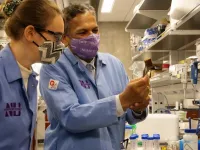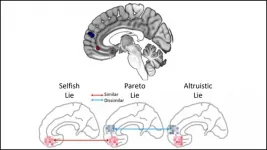Overconfidence in news judgement
New study shows that overconfidence in news judgment is associated with false news susceptibility
2021-05-31
(Press-News.org) A new study published in Proceedings of National Academics of Sciences finds that individuals who falsely believe they are able to identify false news are more likely to fall victim to it. In the article published today, Ben Lyons, assistant professor of communication at the University of Utah, and his colleagues examine the concern about the public's susceptibility to false news due to their inability to recognize their own limitations in identifying such information.
"Though Americans believe confusion caused by false news is extensive, relatively few indicate having seen or shared it," said Lyons. "If people incorrectly see themselves as highly skilled at identifying false news, they may unwittingly be more likely to consume, believe and share it, especially if it conforms to their worldview."
Lyons and his colleagues used two large nationally representative surveys with a total of 8,285 respondents. Individuals were asked to evaluate the accuracy of a series of Facebook headlines and then rate their own abilities to discern false news content. Lyons used these two measures to assess overconfidence among respondents and how it is related to beliefs and behaviors.
"Our results paint a worrying picture. Many people are simply unaware of their own vulnerability to misinformation."
The vast majority of respondents--about 90 percent--reported they are above average in their ability to discern false and legitimate news headlines. Three in four individuals overestimated their ability to distinguish between legitimate and false news headlines and respondents placed themselves 22 percentiles higher than their score warranted, on average. About 20 percent of respondents rated themselves 50 or more percentiles higher than their score warranted.
"Using data measuring respondents' online behavior, we show that those who overrate their ability more frequently visit websites known to spread false or misleading news. These overconfident respondents are also less able to distinguish between true and false claims about current events and report higher willingness to share false content, especially when it aligns with their political leanings."
Prior research suggests it may be individuals' lack of skill itself that drives engagement with false news and finds that people who are worse at discerning between legitimate and false news are worse at doing so in their browsing habits. However, Lyons' analysis also shows that inflated perceptions of ability are independently associated with engaging with misinformation, suggesting the perceptual gaps are an additional source of vulnerability.
These results provide new evidence of an important potential mechanism by which people may fall victim to misinformation and disseminate it online. Although the design does not identify the causal effect of overconfidence, these findings suggest that the mismatch between one's perceived ability to spot false stories and people's actual abilities may play an important and previously unrecognized role in the spread of false information online.
After publication, find the full study here.
INFORMATION:
ELSE PRESS RELEASES FROM THIS DATE:
2021-05-31
Phosphate pollution in rivers, lakes and other waterways has reached dangerous levels, causing algae blooms that starve fish and aquatic plants of oxygen. Meanwhile, farmers worldwide are coming to terms with a dwindling reserve of phosphate fertilizers that feed half the world's food supply.
Inspired by Chicago's many nearby bodies of water, a Northwestern University-led team has developed a way to repeatedly remove and reuse phosphate from polluted waters. The researchers liken the development to a "Swiss Army knife" for pollution remediation as they tailor their membrane to absorb ...
2021-05-31
Very high atmospheric CO2 levels can explain the high temperatures on the still young Earth three to four billion years ago. At the time, our Sun shone with only 70 to 80 per cent of its present intensity. Nevertheless, the climate on the young Earth was apparently quite warm because there was hardly any glacial ice. This phenomenon is known as the 'paradox of the young weak Sun.' Without an effective greenhouse gas, the young Earth would have frozen into a lump of ice. Whether CO2, methane, or an entirely different greenhouse gas heated up planet Earth is a matter of debate among scientists. New research by Dr ...
2021-05-31
Art Garfunkel once described his legendary musical chemistry with Paul Simon, "We meet somewhere in the air through the vocal cords ... ." But a new study of duetting songbirds from Ecuador, the plain-tail wren (Pheugopedius euophrys), has offered another tune explaining the mysterious connection between successful performing duos.
It's a link of their minds, and it happens, in fact, as each singer mutes the brain of the other as they coordinate their duets.
In a study published May 31 in Proceedings of the National Academy of Sciences, a team of researchers studying brain ...
2021-05-31
Three groups (Dr. James Birchler's group from University of Missouri, Dr. Jan Barto's group from Institute of Experimental Botany of the Czech Academy of Sciences and Dr. HAN Fangpu's group from the Institute of Genetics and Developmental Biology of the Chinese Academy of Sciences) recently reported a reference sequence for the supernumerary B chromosome in maize in a study published online in PNAS (doi:10.1073/pnas.2104254118).
Supernumerary B chromosomes persist in thousands of plant and animal genomes despite being nonessential. They are maintained in populations by mechanisms of "drive" that make them inherited at higher than typical Mendelian rates. Key properties such as its origin, evolution, and the molecular mechanism for its accumulation in ...
2021-05-31
While it is widely accepted that climate change drove the evolution of our species in Africa, the exact character of that climate change and its impacts are not well understood. Glacial-interglacial cycles strongly impact patterns of climate change in many parts of the world, and were also assumed to regulate environmental changes in Africa during the critical period of human evolution over the last ~1 million years. The ecosystem changes driven by these glacial cycles are thought to have stimulated the evolution and dispersal of early humans.
A paper published in Proceedings of the National Academy of Sciences of the United States of America (PNAS) this week challenges this view. Dr. Kaboth-Bahr ...
2021-05-31
The Sahara has not always been covered by only sand and rocks. During the period from 14,500 to 5,000 years ago large areas of North Africa were more heavily populated, and where there is desert today the land was green with vegetation. This is evidenced by various sites with rock paintings showing not only giraffes and crocodiles, but even illustrating people swimming in the "Cave of Swimmers". This period is known as the Green Sahara or African Humid Period. Until now, researchers have assumed that the necessary rain was brought from the tropics through an enhanced summer monsoon. The northward shift of the monsoon was attributed to rotation of the Earth's tilted axis that produces higher levels of ...
2021-05-31
An emotion regulation strategy known as cognitive reappraisal helped reduce the typically heightened and habitual attention to drug-related cues and contexts in cocaine-addicted individuals, a study by Mount Sinai researchers has found. In a paper published in PNAS, the team suggested that this form of habit disruption, mediated by the prefrontal cortex (PFC) of the brain, could play an important role in reducing the compulsive drug-seeking behavior and relapse that are the hallmarks, and long-standing challenges, of addiction.
"Relapse in addiction is often precipitated by heightened attention-bias to drug-related cues, which could consist of sights, smells, ...
2021-05-31
You may think a little white lie about a bad haircut is strictly for your friend's benefit, but your brain activity says otherwise. Distinct activity patterns in the prefrontal cortex reveal when a white lie has selfish motives, according to new research published in JNeurosci.
White lies -- formally called Pareto lies -- can benefit both parties, but their true motives are encoded by the medial prefrontal cortex (MPFC). This brain region computes the value of different social behaviors, with some subregions focusing on internal motivations and others on external ones. Kim and Kim predicted activity patterns in these subregions could elucidate the true motive behind white lies.
The research team deployed a stand in for white lies, having participants tell lies to earn a reward ...
2021-05-31
By including multi-ethnic participants, a largescale genetic study has identified more regions of the genome linked to type 2 diabetes-related traits than if the research had been conducted in Europeans alone.
The international MAGIC collaboration, made up of more than 400 global academics, conducted a genome-wide association meta-analysis led by the University of Exeter. Now published in Nature Genetics, their findings demonstrate that expanding research into different ancestries yields more and better results, as well as ultimately benefitting global patient care.
Up to now, nearly 87 per cent of ...
2021-05-31
Artificial intelligence promises to be a powerful tool for improving the speed and accuracy of medical decision-making to improve patient outcomes. From diagnosing disease, to personalizing treatment, to predicting complications from surgery, AI could become as integral to patient care in the future as imaging and laboratory tests are today.
But as University of Washington researchers discovered, AI models -- like humans -- have a tendency to look for shortcuts. In the case of AI-assisted disease detection, these shortcuts could lead to diagnostic errors if deployed in clinical settings.
In a new paper published May 31 in Nature Machine Intelligence, ...
LAST 30 PRESS RELEASES:
[Press-News.org] Overconfidence in news judgement
New study shows that overconfidence in news judgment is associated with false news susceptibility





